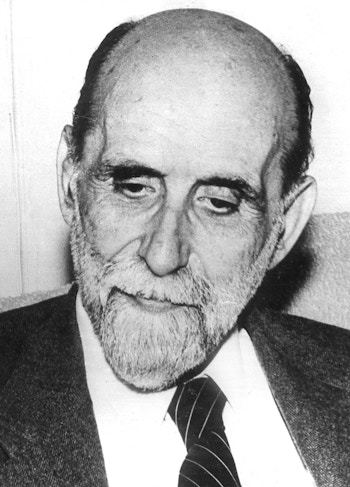
Juan Ramón Jiménez Mantecón was born in Moguer, a small city in Andalucia, Spain, on December 23rd, 1881. He wrote poems as a boy and had an early interest in painting. He attended San Luis Gonzaga, a Jesuit school outside of Cadiz, before enrolling at the University of Seville to study law. Rubén Darío, the founder of Spain’s French-influenced modernismo poetry movement, encountered Jiménez’s writing and invited him to move to Madrid to join his circle.
Darío helped Jiménez to publish his debut collection, Almas de violeta (Souls of Violet), in 1900. However, following his father’s death later that year, Jiménez suffered a breakdown. He stayed in a sanatorium in Bordeaux, where he and his doctor’s wife carried on an affair, then another in Madrid, whose staff of novice nuns inspired some of his erotic poetry. He moved back to his hometown in 1905, writing prolifically, as he would throughout most of his life. His poetry during this period features an emphasis on color and music and was influenced by the French symbolist poetry that informed the modernistas, as well as by German Romantic literature and the works of W. B. Yeats.
Jiménez moved back to Madrid in 1912, working as a publication director for the Residencia de Estudiantes of Madrid. There, he wrote his celebrated prose poem collection Platero y yo (Platero and I), a book about a writer and his donkey that has seen multiple modern adaptations. In 1916, he married Zenobia Camprubí, a Spanish poet, writer, and translator who brought the works of Bengali poet Rabindranath Tagore into Spanish. The pair became collaborators, working jointly on each other’s publications and translating Irish playwright John Millington Synge's Riders to the Sea into Spanish together. By this time, Jiménez’s style had fully developed into the formally inventive, direct style he is renowned for.
Jiménez’s reputation grew as he continued to publish poetry, and he established himself as an editor and writer of critical works as well. By the 1920s, he was widely considered the leading Spanish poet of his generation. He and Camprubí moved to Seville in 1930, where they lived until the Spanish Civil War broke out in 1936. They fled to North America, living in Cuba, Puerto Rico, Florida, and Washington, D.C., before settling down in Puerto Rico in 1951. During their travels, Jiménez taught at the University of Miami and the University of Maryland, finally becoming a professor of Spanish Language and Literature at the University of Puerto Rico. He received the Nobel Prize in Literature in 1956. This triumph, however, was marked with sadness, as Camprubí died of ovarian cancer two days later. The loss struck Jiménez deeply, and he died two years later in Puerto Rico.
-
More Juan Ramón Jiménez
Text: Jiménez' "One Night" at Academy of American Poets
Audio: Recordings of Jiménez speaking and reading from his work from the Library of Congress
Text: An excerpt from Jiménez' "Time, Give Me the Secret" featured on Poets House's Poetry Path